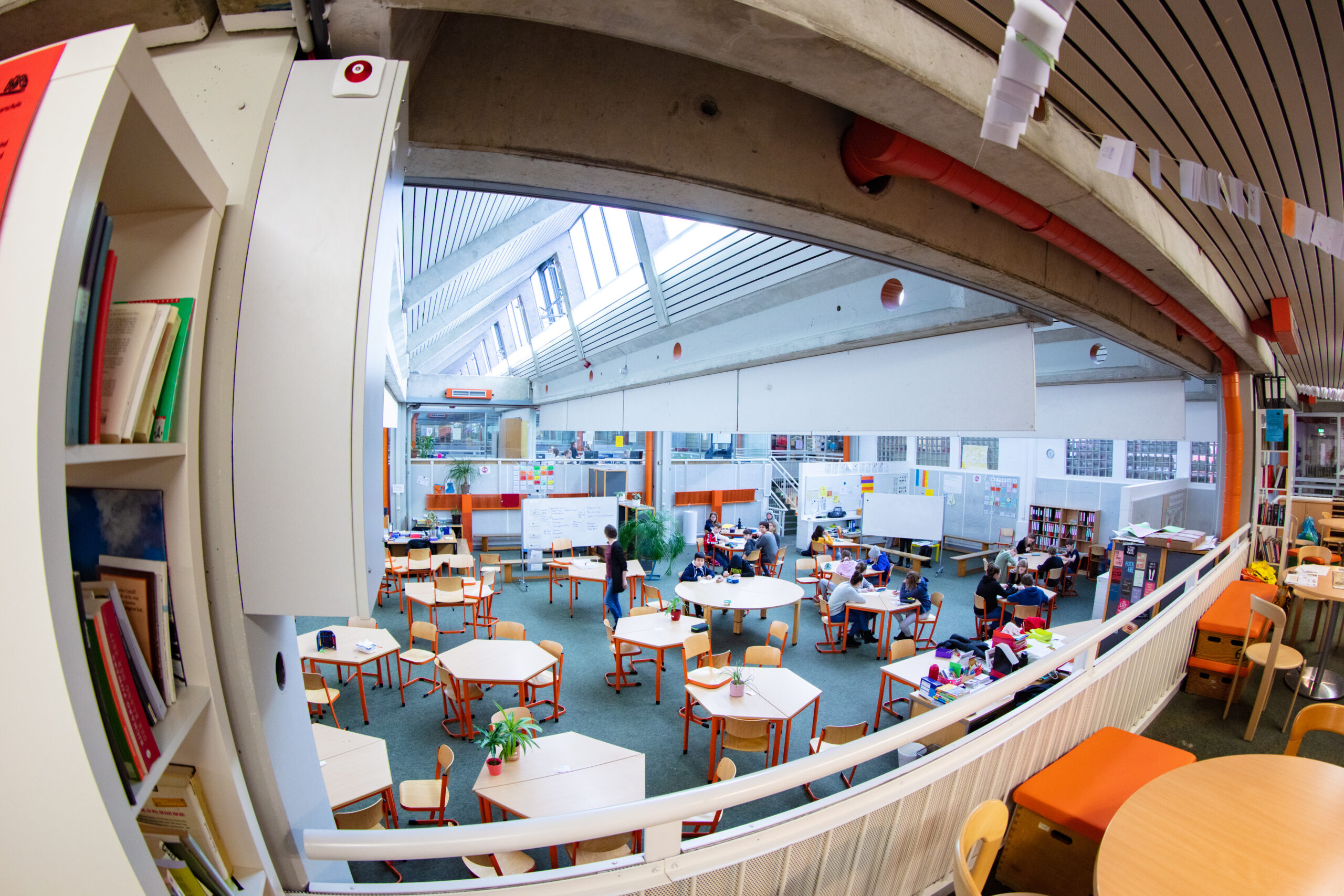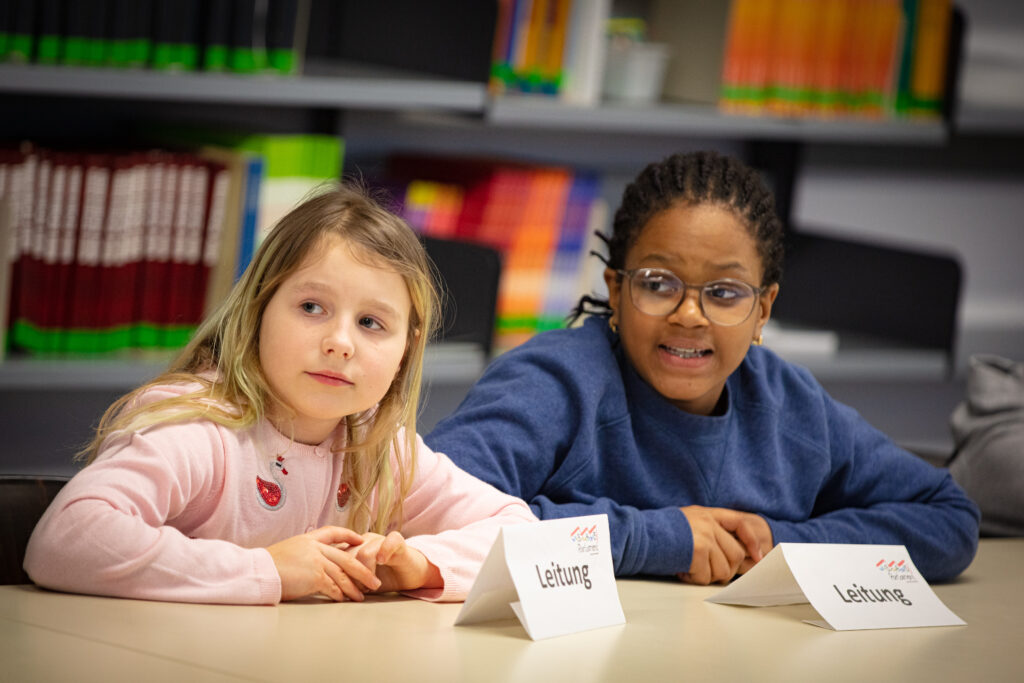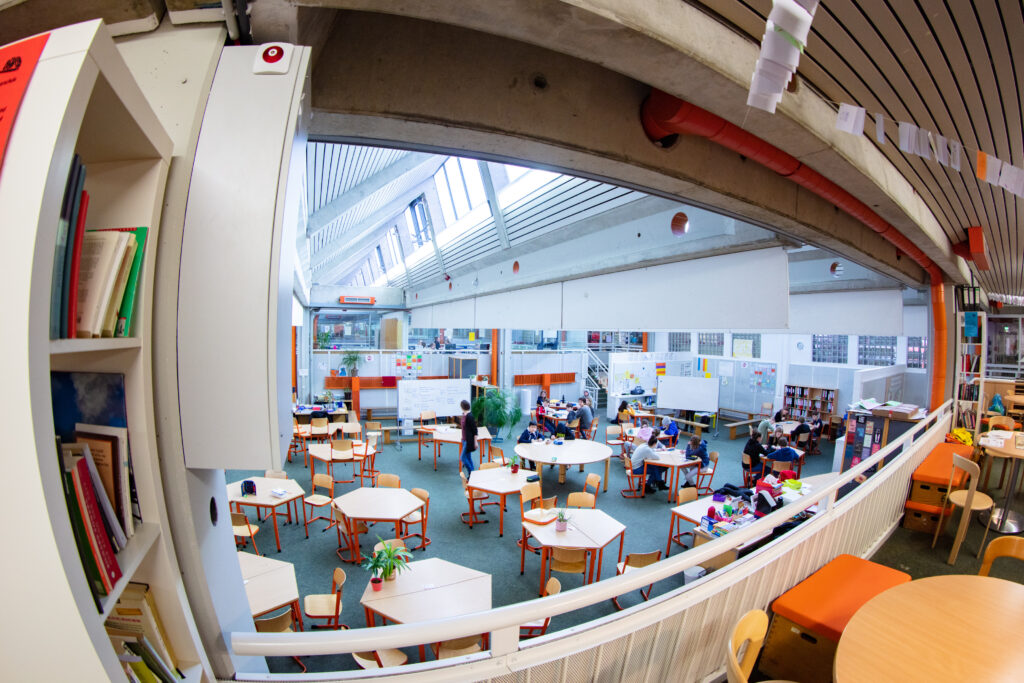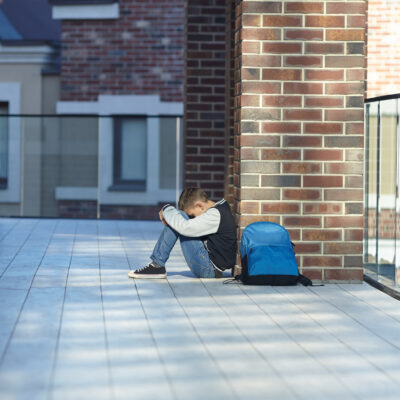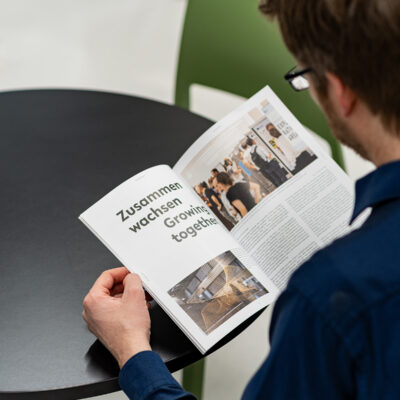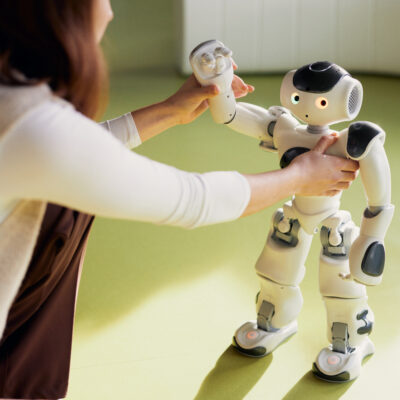The mission is as valid today as it was 50 years ago. The Bielefeld Laborschule and the Oberstufen-Kolleg are constantly experimenting and researching on how teaching and good learning can succeed. The two experimental schools in the state of North Rhine-Westphalia have influenced and changed the school landscape with their work. Yet, not all findings are put into practice as consistently as those involved would sometimes like.
Learning English in primary school, all-day schooling, interdisciplinary work, and learning in small groups instead of face-to-face teaching—many things that are taken for granted in mainstream schools today were devised and tested at the Laborschule and the Oberstufen-Kolleg.
Professor Dr Annette Textor is nevertheless cautious about attributing individual educational innovations solely to Bielefeld’s experimental schools. ‘Schools always have many sources and inspirations,’ says the head of the Laborschule Research Unit. This is, so to speak, the school’s research department. Based at the university’s Faculty of Educational Science, it investigates such topics as how can children benefit even more from cross-grade learning or how can approaches to civic education be further developed.
‘We believe that we have been responsible for transferring major parts of these approaches into the school system,’ says Annette Textor. ‘But we’re not the only ones working on this. And it’s difficult to prove what can be attributed specifically to us.’
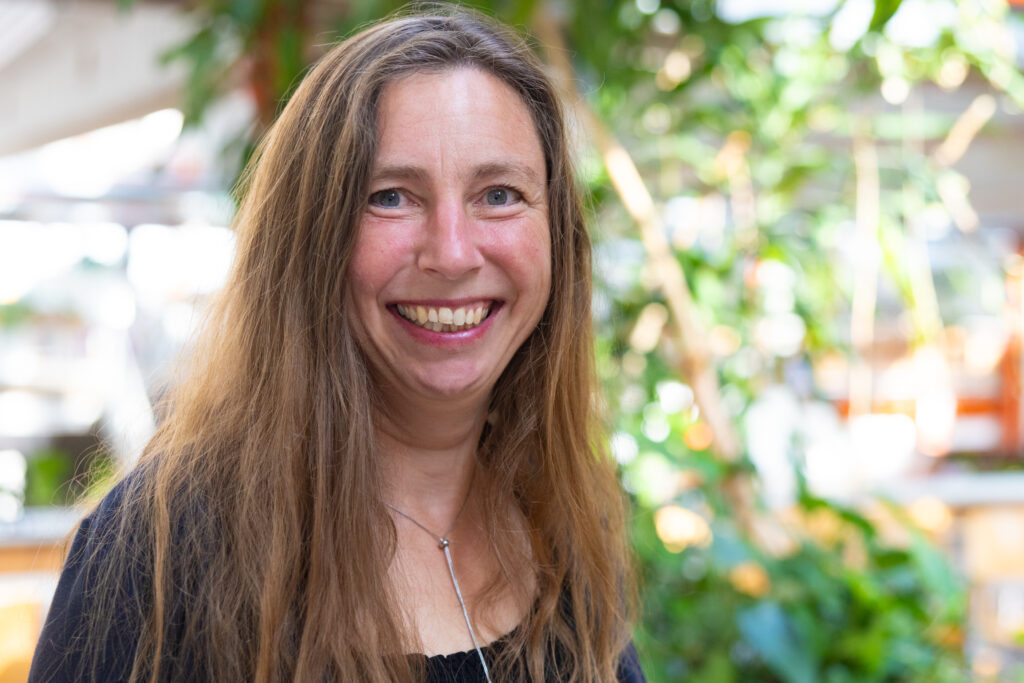
© Mike-Dennis Müller
Promoting inclusion, living democracy
In any case, what is far more important is to pass on knowledge and disseminate pedagogically meaningful approaches—through further training for teachers, lesson observations, and networking, explains Rainer Devantié, who has been head of the Laborschule since 2014. He finds that the Laborschule has been particularly successful in implementing inclusion, and that it sets an example in this for other schools. It is always seen in the broader context of practising the concept of democracy—that is, as an attempt to ensure equal participation in the wealth of society for all.
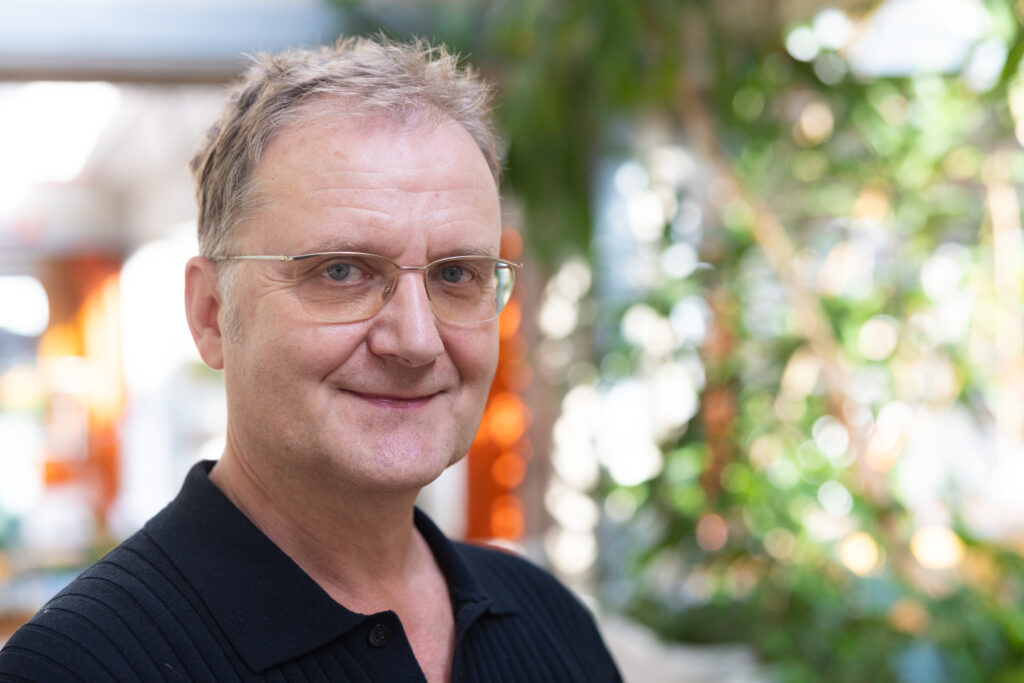
© Mike-Dennis Müller
How does school work without grades? What happens when children are allowed to have a say in lessons? When there is no having to repeat a school year and no classrooms? When the two experimental schools in North Rhine-Westphalia were founded in September 1974, such ideas were pretty revolutionary, but the time seemed ripe for change. There was a spirit of optimism in society, education was a key word to move the country forward, and reform pedagogue Professor Dr Hartmut von Hentig was able to realize his vision of a ‘laboratory school’ in Bielefeld following the tradition of the American pedagogue and philosopher Jon Dewey. The fiftieth anniversary of both schools will be celebrated with a week of festivities entitled ‘50 years of new learning’ from 9 to 14 September.
Practice-based research in everyday school life
One of the principles when founding the school was to have close ties to the university: practice and research should be closely interlinked. This is still the case today. ‘A large part of the ideas along with the research work comes from the teachers,’ emphasizes Annette Textor, who is delighted with what she calls this ‘cooperative, circular process’.
It means that teachers repeatedly become researchers, address problems from everyday school life, and develop concepts together with academics. These are then tested in the classroom before being evaluated, further developed, or discarded in cooperation with the university. ‘This creates a great deal of practical relevance, and many topics from everyday school life are taken up that might otherwise go unnoticed,’ adds Professor Dr Martin Heinrich, who heads the Oberstufen-Kolleg Research Unit at the university. ‘And we also find out things that nobody really wants to hear.’
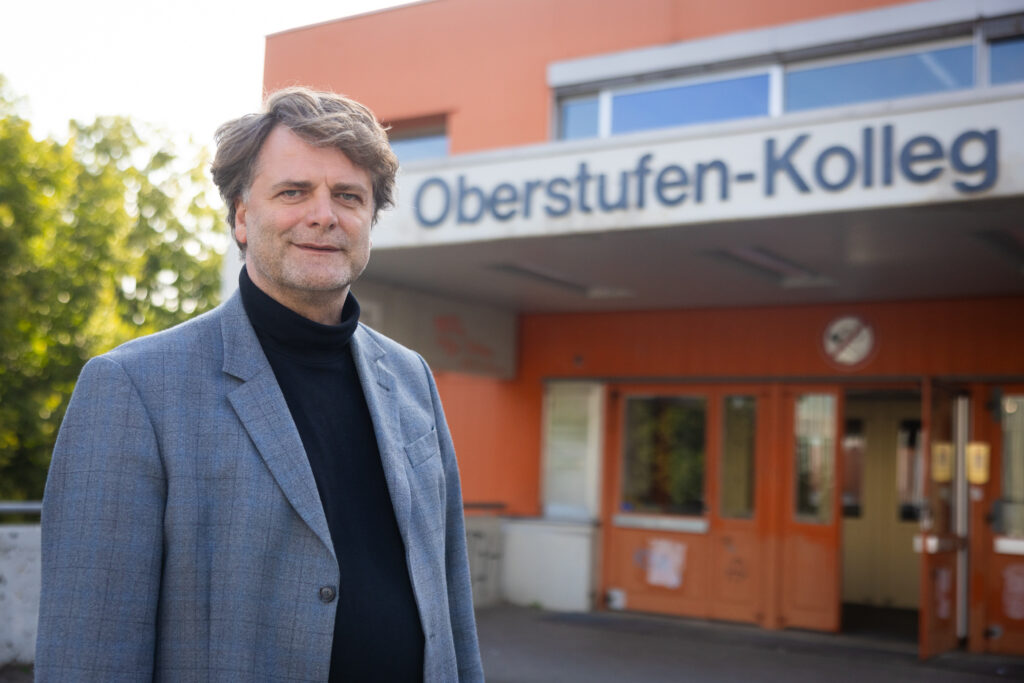
© Mike-Dennis Müller
Freedom creates opportunities
What specifically does he mean by this? Too many children fail at school, receive too little support, and are selected for different tracks at a too early age, Heinrich explains. ‘If it was not for the special regulations at the Oberstufen-Kolleg, around one third of its pupils would not have a legally binding recommendation to enter upper secondary education (a so-called Q-Vermerk), meaning that they would be excluded right from the start. However, with our approach, more than one half of these pupils will go on to gain upper-secondary school-leaving qualifications (Abitur or Fachhochschulreife). Actually, this is a major censure of the existing system.’
As an inclusive primary and comprehensive school, the Laborschule also demonstrates that schooling works without having to repeat a school year, assign grades, and award certificates. Grades are only introduced from year 9 onwards to provide pupils with recognized school-leaving qualifications. And almost all of them achieve these, emphasizes Annette Textor, ‘even those requiring special education who would otherwise drop out of the system’—and this is as many as ten per cent of pupils at the Laborschule. Overall, the graduation rate at the Laborschule is around 98 per cent compared to 94 per cent in the mainstream school system. As Heinrich says: ‘We are still a provocation for the school system, and we show that many things would be possible if we wanted them and gave the schools the freedom they need.’
School reforms confirm Bielefeld practice
But some progress is also being made, adds Dr Lutz van Spankeren—‘despite all the questionable standardization efforts by the assembly of education ministers of the German states (the Kultusministerkonferenz)’. For the head of the Oberstufen-Kolleg, the current position paper from the North Rhine-Westphalian Ministry of Education largely confirms the long-standing education practice of the Oberstufen-Kolleg. ‘More freedom of choice in the subjects, a strengthening of interdisciplinary perspectives, the upgrading of possible formats for crediting performance beyond written examinations, and, last but not least, the introduction of exam presentations in the Abitur. These all open up possibilities that have long been anchored in the training and examination regulations that make up the educational self-image of the Oberstufen-Kolleg.’
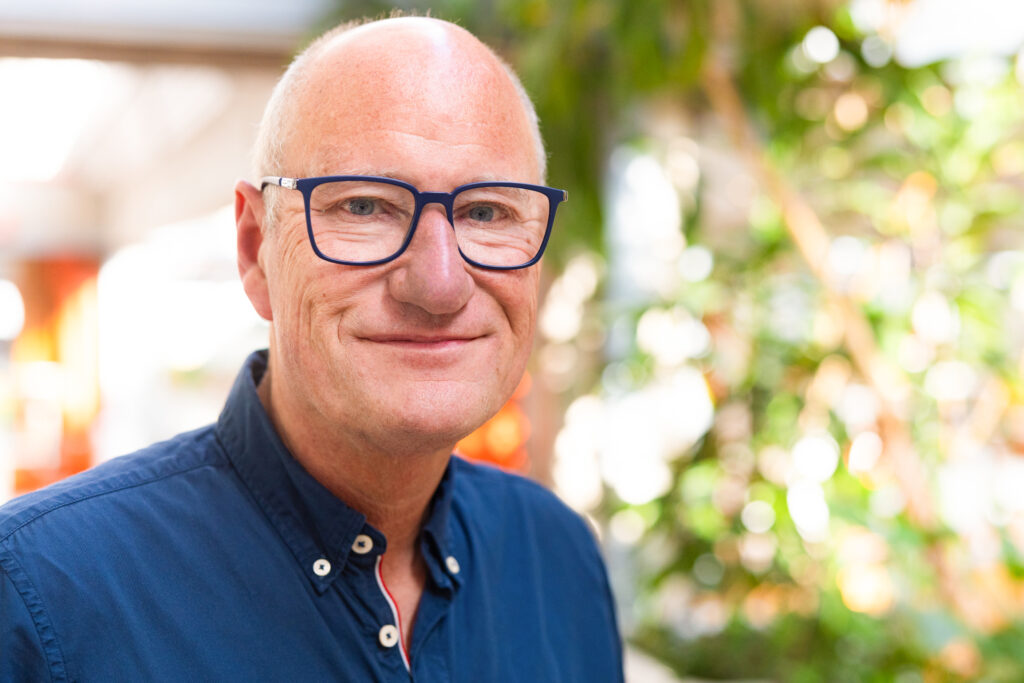
© Mike-Dennis Müller
New experimental schools being founded across Europe
Above all, Martin Heinrich would like to see more pragmatism, flexibility, and practical changes, and these can vary greatly from school to school. The ‘Blick über den Zaun’ (Looking outside the box) school alliance with around 130 reform schools shows how this can work. Heinrich is also pleased to note that several experimental schools linked to universities are currently being set up in Germany and Europe, for example in Dresden, Cologne, and Aachen. Others, for example in Essen and Potsdam, are set to follow. ‘Perhaps this is also one of our top exports,’ says Heinrich. ‘For a few decades, it seemed that we had become an anachronism and were working in isolation. Now we’re back in fashion.’
Keyword: Civic education
Having a say, taking on social responsibility, living and learning about democracy on a small scale—these principles run like a common thread through the history of the experimental schools. In the early years, the main focus was on enabling co-determination through structures and establishing committees such as student representatives, explains Martin Heinrich. In the meantime, it has become increasingly important to deal with diverse opinions, to think in complex contexts, and to help shape one’s own environment. At the Oberstufen-Kolleg, for example, young people can get involved in the interdisciplinary course ‘Democratic Participation’ and improve their everyday school life. In a recent project, for example, they addressed gender issues and installed unisex toilets at the Oberstufen-Kolleg. Another example comes from the Laborschule: co-determination is not only possible from Year 5 onwards, but already at primary school level. Even the youngest pupils can get involved in group councils and pupil parliaments. In a complex process, a ‘constitution’ was drawn up that precisely defined which decisions the adults make, what the children decide on their own, and what they decide together with teachers. For example, the children are allowed to decide what they wear. ‘This can also lead to them playing outside in puddles with only socks on their feet,’ says Annette Textor. In lower secondary school, the focus then shifts increasingly towards dealing with the opinions of others, making decisions as a group, and finding compromises.
